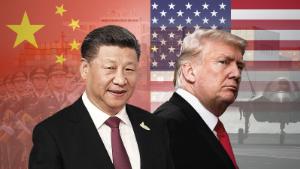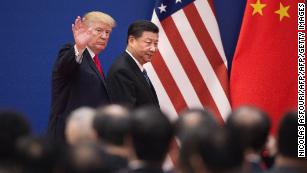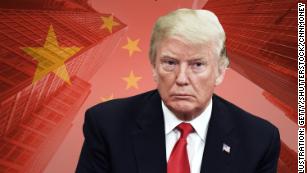Are Trump and Xi on the brink of a new Cold War?
There is growing realization -- and fear -- among Chinese officials in Beijing that US President Donald Trump could be serious in his promise to upend the types of bilateral relations they have become accustomed to in the past few decades.
It is a shock for Beijing to realize that reports about an administration-wide policy initiative countering China are more than mere Washington hearsay.
Since June, United States and China's diplomatic ties have deteriorated rapidly across a range of fronts, not just trade but also military and politics.
It may not be the start of the next Cold War, at least not yet, but relations between the two sides have been plunged into an unprecedented deep chill.
Now Chinese President Xi Jinping may meet with Trump at the annual G20 leaders summit in Buenos Aires in November in an effort to broker a solution. Policy experts on both sides worry it may already be too late to find a way back.
"There has been a tidal shift in America in proportions I've not seen in my lifetime away from the old notions of engagement," Orville Schell, director at the New York-based Asia Society's Center on US-China relations, told CNN.
"I think we're at the last act where some notion of more cooperative relationship could be rescued."
The China threat
A year ago, few would have imagined bilateral ties could plummet to such new lows in the world's most important diplomatic relationship.
In the 1990s and 2000s, people used to look at three Ts -- Taiwan, Tibet and Tiananmen (massacre) as the most contentious topics in US-China relations. While these thorny issues remain, they have faded into background over the years.
Now, as Taiwan reappears on the radar of the White House, two other Ts dominate frosty bilateral ties -- Trade and, most importantly, Trump.
US moves to limit nuclear sales to China
In remarks to a Washington think tank last week, US Vice President Mike Pence launched a broad attack on Chinese policies ranging from human rights abuses at home to claims of election meddling in the US.
"As we speak, Beijing is employing a whole-of-government approach, using political, economic, and military tools, as well as propaganda, to advance its influence and benefit its interests in the United States," Pence said in his speech.
Many observers have compared Pence's remarks to Winston Churchill's famous "Iron Curtain" speech, and predicted the start of a new Cold War. Both governments have taken pains to brush aside such a notion, at least publicly, with Chinese officials especially highlighting continued intertwined bilateral economic interests despite the trade war.
Days after Pence's speech, FBI Director Christopher Wray doubled down on the vice president's comments, saying China posed greater danger to the United States than Russia.
"China in many ways represents the broadest, most complicated, most long-term counterintelligence threat we face," he said at a US Senate hearing on Wednesday.
The sudden reversal in relations with Washington has been a shock to Beijing who thought they had Trump's number, running a long campaign to mollify and flatter the US leader.
As recently as August 2017, state media tabloid Global Times wrote in an editorial that Trump was just a "paper tiger," a Chinese expression for a person who projects strength but is secretly weak underneath.
"(But) the growing view in China is that the Trump administration is out to contain China and thwart its goal of national rejuvenation," Bonnie Glaser, director of the CSIS China Power Project in Washington, told CNN.
'Great disorder under heaven'
Reactions to this new reality couldn't be more different in Washington and Beijing.
In the US, where politics is now highly partisan, China has become an unlikely lightning rod that has united Republicans and Democrats -- an amazing feat in Trump's Washington.
Across the political spectrum, government officials, academic experts and business leaders increasingly agree on the urgent need to shake up US-China relations, which they say have been lopsided for too long to China's advantage -- a point frequently made by Trump.
Trump rips up the trade playbook to take on China
"They lived too well for too long and frankly, I guess they think that the Americans are stupid people. Americans are not stupid people," Trump told the "Fox and Friends" TV program in an interview on Thursday.
According to Schell, the Asia Society expert, America is at an extremely critical inflection point, "we'll look back and either we'll be able to pull back from the brink or we'll go straight into a clash of civilizations."
Many China-watchers in the US cheered the recent speech by Pence, calling it long overdue. The only exception many take, ironically, seems to be the most serious allegation made by the administration: claims of Chinese efforts to interfere in the upcoming US midterm elections.
Analysts say the White House's decision to depict longstanding Chinese practices, such as buying advertorials in US newspapers, as election-meddling tactics would only weaken the US argument on threats posed by Beijing.
Still, the unusual bipartisan consensus on China means even Trump skeptics -- both inside and outside the administration -- give the president credit for throwing the Beijing leadership totally off balance with his unpredictable and unconventional approach to foreign policy.
"The Trump administration are a little bit like Chairman Mao, (who once said) to create 'great disorder under heaven' ... He's not afraid to tear it down or risk tearing it down and that's something no president before has been willing to do," Schell said.
Beijing softening?
A senior US official recently told CNN Trump's waves of tariffs on Chinese imports have caused the Chinese government -- known for its meticulous planning -- to scramble for responses, with likely no apparent winning counter-measures.
The official echoed Trump's public assessment that the US strategy is working and the Chinese will cave in under mounting economic pressure.
News Courtesy: www.cnn.com













